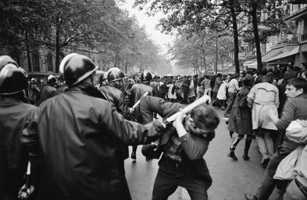
Paris Uprising: Students are injured by policemen on a Paris street during the violent riots of May 1968
One by one, the venerable political leaders who had guided Western Europe through its early postwar turmoil gave way during the '60s to a new generation. In 1963 West Germany's crusty Konrad Adenauer (der Alte) resigned at the age of 87 after 14 years as Chancellor. That same year, Harold Macmillan, an old reliable blueblood of Britain's Conservative Party, resigned as Prime Minister at 69, officially because of poor health. (A subsidiary factor: the scandal caused by his War Minister, John Profumo, who had lied to Commons about his affair with a call girl.) Death claimed the widely beloved Pope John XXIII, 81, who had opened the Roman Catholic Church to winds of change by summoning the Second Vatican Council. At decade's end even the seemingly indestructible Charles de Gaulle was dead at 79, 18 months after he had resigned as President of France, having weathered a near revolution only to lose a referendum on regional reform.
Until then, De Gaulle had been Western Europe's most formidable — and most unpredictable — political force. At terrible cost and at great personal risk he had extracted France from the morass of the eight-year Algerian civil war in 1962, earning the enmity of colonialist right-wingers. His Europe-focused foreign policy was based on forging a strong alliance with West Germany, the former enemy. De Gaulle was loftily indifferent to former ally Britain, and it was largely at his instigation that the country was denied admission to the European Economic Community in 1963 (Britain was accepted as a member 10 years later). Wary about the depth of America's commitment to the defense of Europe, he withdrew France from NATO in 1966 and spent billions of francs to maintain a French nuclear force de frappe.
Politically, Europe faced years of troubling uncertainty and continuing cold war jitters. The erection of the Berlin Wall in 1961 had reminded the West that Moscow would use whatever means it took to keep the East bloc satellites under key and lock. Proof came in 1968, when the Soviets and their allies invaded Czechoslovakia to oust the reform-minded regime of Alexander Dubcek. A chilling frost ended what had been heralded as the "Prague spring," an experiment in humanized communism.
Yet it was a time of resurgence for the left in Western Europe, in the form of democratic socialist parties. Conservatives feared — unfairly, for the most part — that the socialist successes might lead to a softening of resistance to Moscow's siren calls. A case in point was the Ostpolitik of Social Democrat Willy Brandt, the dynamic former mayor of West Berlin who became West Germany's Chancellor in 1969. In fact, the goal of Brandt's opening to the East was not appeasement but the lifting of East-West tensions. Ironically, for all the conservative concerns in the West, Ostpolitik was seen in Moscow and other East bloc capitals as a subtle form of Western aggression.
Nonetheless, there were a few promising signs that East-West detente could be made to work. In 1963 Britain, the U.S. and the Soviet Union signed the nuclear test-ban treaty. Also that year, emergency hot lines were installed in the White House and the Kremlin, thereby measurably reducing the possibility of an accidental nuclear holocaust. That likelihood was further reduced in 1964 when the Soviet leadership ousted the impulsive, belligerent Nikita Khrushchev in favor of the equally tough-minded but more phlegmatic Leonid Brezhnev. It was during Brezhnev's reign, however, that the Soviets began a massive military buildup that would ultimately lead to the regime's undoing.
The real threats to West European stability in the '60s came not from the East but from within. In November 1967, sociology professors and their students at the University of Nanterre went on strike for a seemingly trivial reason: an end to visiting restrictions at single-sex dormitories. Protests by French students, of course, were hardly new; thousands had rioted in sympathy with their American counterparts who were opposed to the deepening U.S. military involvement in Vietnam; before that, they had protested against the Algerian war. Yet by May 1968, the cause of university reform in France had become a national crusade supported by 10 million striking workers. On a lesser scale, similar riots by the children of Marx and Coca-Cola (as French filmmaker Jean-Luc Godard called them) rocked Italy and West Germany. Not since 1848 had Western Europe been quite so caught up in the spirit of vague, libertarian revolution.